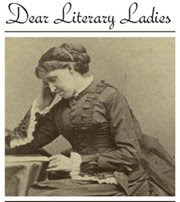
A note from Nava: Occasionally I will cycle back to favorite posts from the early days of this blog, which are now buried within these pages. Here's one of them:
Dear Literary Ladies,
Like most writers, I want to be published, and truth be told, I’d love to be successful. But I’ve heard so many stories of long years of toil, false starts, and tons of rejection. Isn’t there an easier way? I’d prefer to become an overnight success, earn fame and fortune, and avoid all the struggle.
I can only say to you as I do to the many young writers who ask for advice—There is no easy road to successful authorship; it has to be earned by long and patient labor, many disappointments, uncertainties and trials. Success is often a lucky accident, coming to those who may not deserve it, while others who do have to wait & hope till they have earned it. This is the best sort and the most enduring.
I worked for twenty years poorly paid, little known, and quite without any ambition but to eke out a living, as I chose to support myself and begin to do it at sixteen . . . “Little Women” was written when I was ill, and to prove that I could not write books for girls. The publisher thought it flat, so did I, and neither hoped much for or from it. We found out our mistake, and since then, though I do not enjoy writing “moral tales” for the young, I do it because it pays well.
But the success I value most was making my dear mother happy in her last years & taking care of my family. The rest soon grows wearisome & seems very poor beside the comfort of being an early Providence to those we love.
—Louisa May Alcott, from a letter, 1878
Isn't there an easy road to writing success?
Am I talented enough to be a successful writer?
A note from Nava: Occasionally I will cycle back to favorite posts from the early days of this blog, which are now buried within these pages. Here's one of them:
Dear Literary Ladies,
Sometimes I wonder if I really have what it takes to be a successful writer. The desire is definitely there, but I’m not sure I have the talent. For those of us who don’t feel particularly “gifted,” what hope is there?
I didn’t have any particular gift in my twenties. I didn’t have any exceptional qualities. It was the persistence and the great love of my craft which finally became a discipline, which finally made me a craftsman and a writer.
The only reason I finally was able to say exactly what I felt was because, like a pianist practising, I wrote every day. There was no more than that. There was no studying of writing, there was no literary discipline, there was only the reading and receiving of experience. . .
So I would like to remove from everyone the feeling that writing is something that is only done by a few gifted people . . . You shouldn’t think that someone who achieves fulfillment in writing and a certain art in writing is necessarily a person with unusual gifts. I always said it was an unusual stubborness. Nothing prevented me from doing it every night, after every day’s happenings.
Anaïs Nin, “The Personal Life Deeply Lived” (from a series of lectures, 1973)



